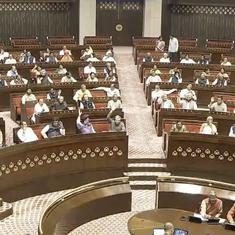The incident comes amidst a rising sense of communal polarisation in the area. Four mosques have been vandalised since the beginning of this year, one of them, in the wake of a Hindu Hrudaya Sangama organised in January in Puttur, a small town near Mangalore.
One indication of the tension in Mangalore was evident in the reaction to a playful photo of a group of students on February 18, the day after Modi's statement.
The photo showed a group of students horsing around in a classroom, with one boy lying across the laps of five girls. All of them are smiling into the camera. But the image caused a storm when it began to be passed around on Whatsapp and other social media networks. It turned out that the boy was Muslim and the girls were Hindu.
It didn’t take long for the Bharatiya Janata Party’s student wing, the Akhil Bharatiya Vidhyarthi Parishad, to demand that the college management should take action.
On February 22, one of the boys in the photograph, Mohammed Riyaz, was abducted near his home and assaulted in an isolated spot. His attackers demanded to know the whereabouts of the boy who had been lying on the girls’ laps. As it turns out, the boy is being hidden in a safe location with the help of the police. He has not been home for more than a week.
A few days after Riyaz was beaten up, a Hindu woman and a Muslim man, former colleagues at a call centre in the city, were roughed up a group of people suspected to belong to a Hindutva organisation. The group assaulted the man and brought the two friends to the police station, claiming the man was carrying out “love jihad”. The police scolded the assaulted man, and refused to file an FIR against his attackers.
The Mangalore unit of People’s Union for Civil Liberties said that since the beginning of 2014, there have been 36 reported cases of “moral policing” in the Udupi and Dakshina Kannada districts of coastal Karnataka. Six instances occurred in January alone.










